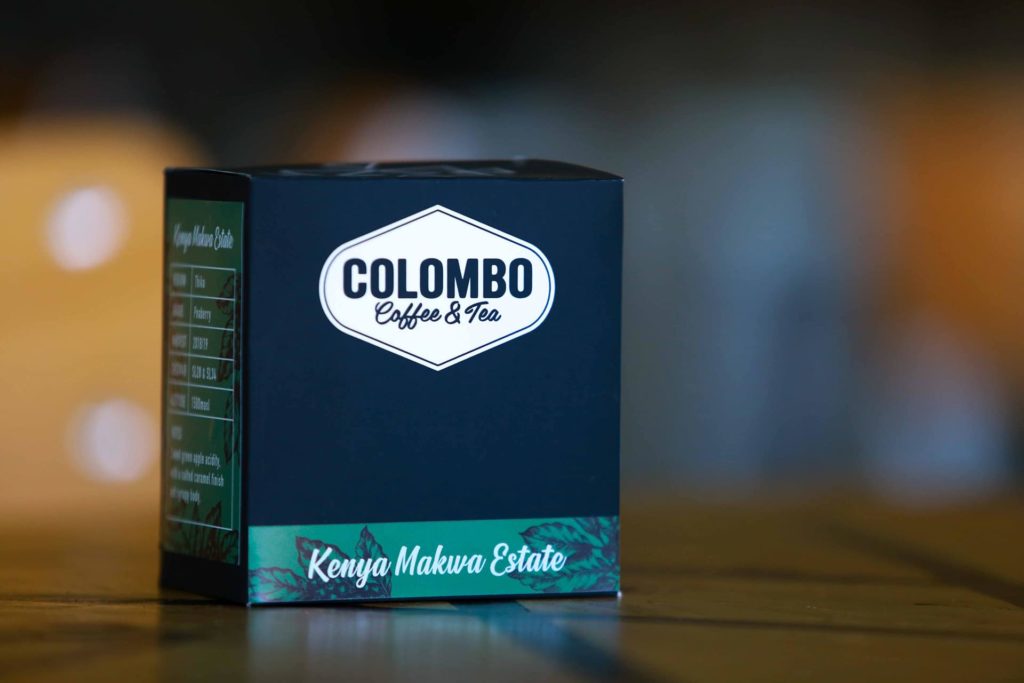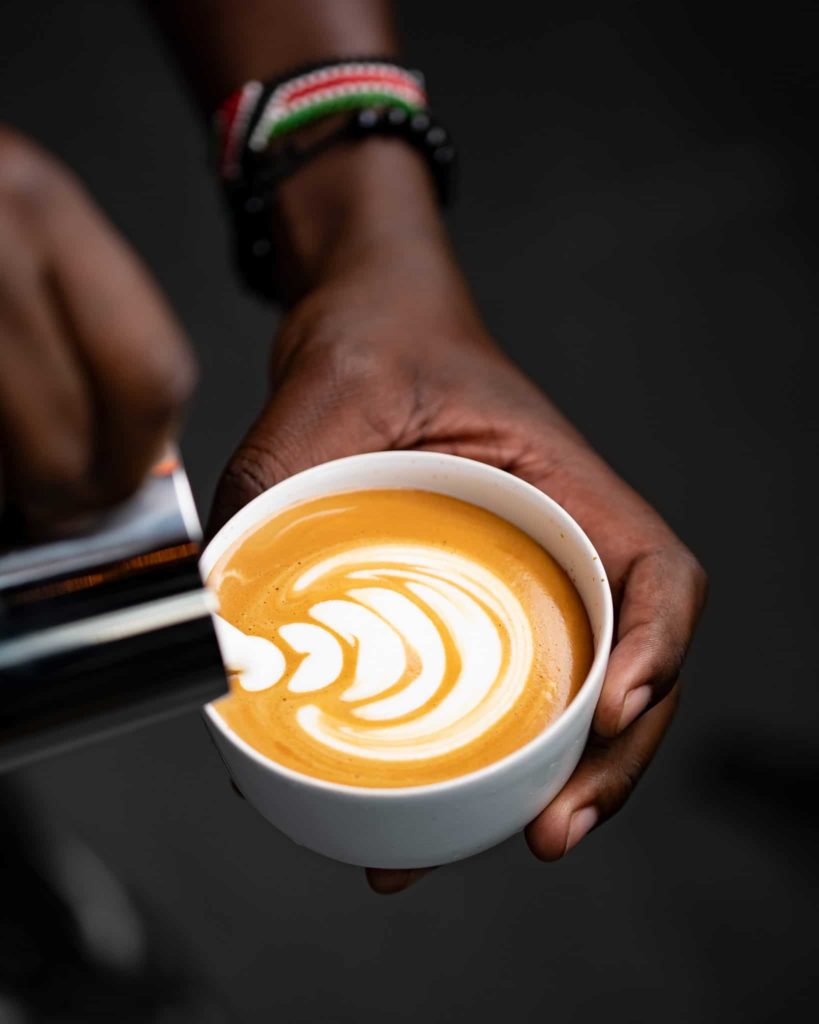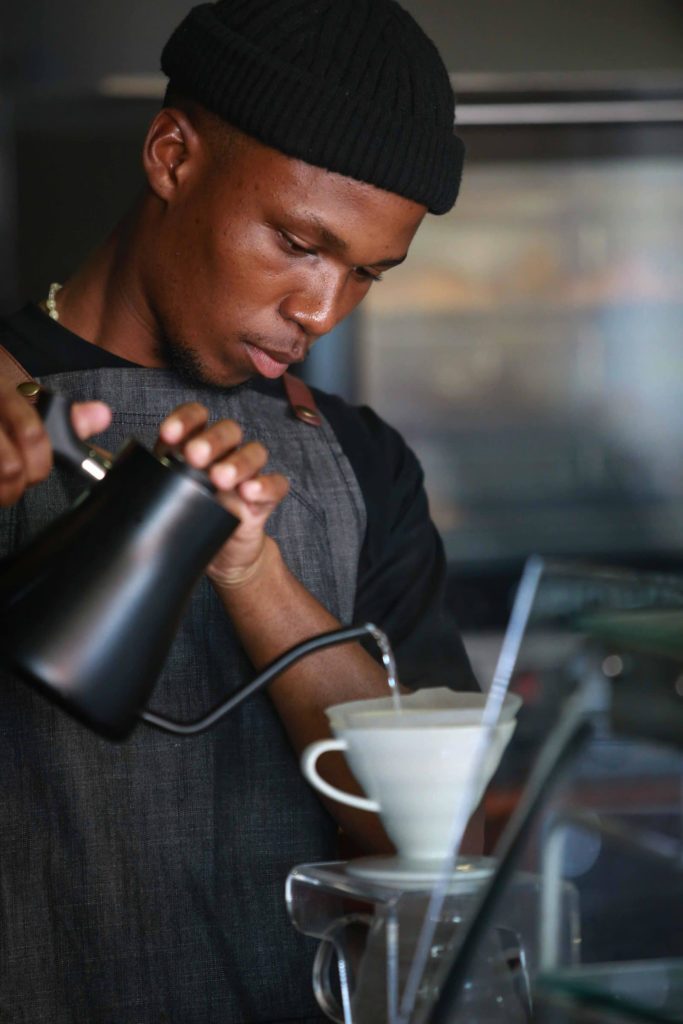It is 8:00 AM at Aspire Centre, located in the Westlands neighborhood of Nairobi, and barista Robert Oldatir Wanderi is on bar. We’re at the Barista Coffee Lounge, a coffeehouse that offers a wide selection of coffees from across Kenya. Like many other working baristas in big-city coffee shops across Kenya, Wanderi braces for yet another busy morning.
He switches on the espresso machine and allows pressure to build up. He then checks the calibration of the grinder to ensure the grind is to satisfaction. His customers today will order all different types of coffee, including espressos, Americanos, macchiatos, cappuccinos, lattes, and mochas, as well as French press.
“Our clientele mostly consists of men,” says Wanderi. “Most of our clients fall between the ages of 20-40 on average and consist of professionals working remotely, friends meeting for a catch-up, and corporates utilizing our conferencing facilities. We mostly cater to the middle- and upper-middle class. Students are not avid coffee drinkers hence we hardly have them for clients,” he tells Sprudge.
Each day, billions of cups of coffee are consumed across the globe. The coffee world tends to be split into two halves: consumers (economically powerful countries) on one hand, and on the other, producers (also the least developed countries). Africa largely falls in the producing category, with the vast majority of its coffee exported to the global market; the notable exception here is in Ethiopia, where a longstanding local coffee tradition has roots in the very earliest appreciation of coffee as a delicacy.
“Very few producing countries consume locally produced coffee,” admits Charles Denison, co-director of South Africa’s Colombo Coffee. “Many producing countries such as Kenya and Tanzania have a large tea-drinking population, with instant coffee also outselling beans and ground. Price point is also an issue in many communities,” he adds.
Coffee Consumption Background in Africa
Traditionally, Africa has grown coffee for export. The sector has suffered from poor agricultural value chains, high production costs, and an insignificant domestic market. For these reasons and more, coffee producers across the continent have had to export coffee beans instead of extracting the full value. They have had to contend with colonial imperialism that favored the consumption of tea domestically and the exportation of coffee for consumption abroad. Additionally, government policies and value chains made it difficult for coffee beans to flow from farmers to African traders or roasters and to African consumers.

From the farmer, coffee goes to the local buyer, warehouse, transporter, exporter, shipping, to the customs and inspection agents. From there, the coffee changes hands to the importer, roaster, wholesaler, distributor, retailer, to the consumer. To get a cup of coffee, the rural farmer in Africa has to wait for the coffee to change hands again in the reverse direction.
Historically, coffee was brewed using traditional techniques. For example, for many years, old men have taken concentrated hot kahawa chungu (bitter coffee, in Swahili) on the warm streets of the East African coastal towns using tiny ceramic cups. This coffee is brewed over a charcoal stove in large brass kettles evocative of the primordial Arabic world—a communal activity and specialty preserved for men. Gradually, coffee found its way into cafes. Amir Yusuf, Managing Director at Tomoca Coffee in Ethiopia (which also operates a branch in Kenya) captures the main essence of coffee in Africa in his own eloquent way. “Ethiopia is the largest coffee-consuming country in Africa and it is also the origin of coffee,” He tells me. “Drinking coffee in Ethiopia is a tradition and most of the people drink at least three cups a day. While having your cup of coffee you will also interact with other people.” But looking at Africa in general, he says, “coffee consumption is quite low.” Yusuf adds that as the middle class rises, coffee consumption has risen along with it. “More and more people are able to drink a freshly brewed cup of coffee daily,” he says. Yusuf adds that it’s the hope at his company that coffee can be something to bring people together, “kind of like a social therapy”—an aspect of the culture that goes beyond the commodity itself.
Coffee Shop Culture
Today, the new wave of cafe culture is a brewing storm across the continent. Africa is right now enjoying a booming domestic consumption and a flourishing coffee scene.

Higher-income among the emerging middle class and the proliferation of local and international coffee cafes in major urban centers have led to a burgeoning coffee-drinking movement in Africa. Africa has popular cafes like Neo Café in Nigeria, Java House in Kenya, Kaldi’s in Ethiopia, Good African Coffee in Uganda, Zanzibar Coffee House Café and Le Cafeier Coffee Shop in Burundi, Labone Coffee Shop in Ghana, Tony’s in Zimbabwe, Out of Africa Coffee Shop in Namibia, and Rosetta Roastery in South Africa, and many, many others. Drinking coffee in Africa has become an experience that would not have been imagined just a few decades ago—a new generation of Africans embracing the enjoyment of coffee as a cultural and culinary birthright.
Today, coffee plays an important social role that helps people build relationships that transcend cultural and geographical boundaries. In Africa, coffee is fast becoming an important social lubricant that is helping people better communicate, bond, transact business, hang out, study, work, and perform other important day-to-day activities.
“A cafe has a lot to do with the customers’ personal happy place, reflecting what they relate to best,” says Denison. “Our five cafes are all very different, with the roastery location having an authentic industrial feel, a couple being workplace oriented, and one on a beachside golf course. All with a very different feel and atmosphere.”
Coffee lovers are looking for clean, accessible, and sophisticated leisure spots to breathe off their stresses, Denison says. In response to this, classic coffee shops have risen in the hundreds in major cities. Over a few decades, rural-urban migration, increased travel, and tourism, development of new and expansion of existing urban centers have fueled a vibrant coffee drinking culture in the continent. For example, there were virtually no coffee shops in Kampala 10 years ago.
“There has been an increase in the number of high-end cafes and specialty roasters in the major cities and regions at origin,” says Denison. “For example, in Kampala [Uganda], Kigali [Rwanda], or Nairobi [Kenya], one is looking at double-digit roasteries. In South Africa, in the past few years we have seen more specialty cafes open up in the townships, historically not an option. Trained baristas and roasters are taking quality specialty coffee to areas previously un-serviced by the industry.” Denison estimates South Africa now has about 300 roasters.

“As income increases for the consumer class, they will seek out new experiences that provide value for their money, a focal point for networking, relaxing, and sharing information,” says Dr. Dennie M. Beach, President of Go Africa Cafe, whose most popular shop brand is Kenya AA blend.
COVID-19 Pandemic and Coffee Cafe Response
Unfortunately, coffee cafes were affected by a serious decrease in business due to COVID-19. Since regular business was mostly corporate and since most offices were closed and people were working from home, clientele in cafes had dropped drastically.
To counter this lack of business from regulars, Wanderi tells us, “We made some changes to our menu and offered items that extended our reach from corporate clients to families, individuals, groups of friends, and young professionals. We also added online delivery so as to reach the corporate clients working from home. Additionally, we started engaging social media influencers to further penetrate the market that we had not reached before.”
Yusuf shares the same sentiments, “COVID-19 affected all of us and especially the hospitality sector. People did not go out to get a cup of coffee from a cafe during the pandemic which led to a downfall at most coffee places. The pandemic did on the other hand lead to higher consumption at home. During Covid19 we at Tomoca focused on delivery services of our packed coffee (500g, 250g, 200g, beans, ground) to customers to enjoy in the comfort of their homes. We also shared our own articles explaining how to brew at home and which coffee to choose to help our clients get the same taste at home as in our stores.”
As the pandemic slowly recedes, the promise returns here in Africa, where coffee consumption has become a deeply embedded part of daily life for a new generation of Africans. Many of those who love coffee in Africa today represent something their parents or grandparents could have never imagined: African coffee, cultivated, expertly processed, carefully roasted, and prepared beautifully by Africans, for Africans. Truly there is something special happening here.
Daniel Muraga is an anthropologist and freelance journalist based in Nairobi. This is Daniel Muraga’s first feature for Sprudge.
Photos provided by the cafes, used with permission.
